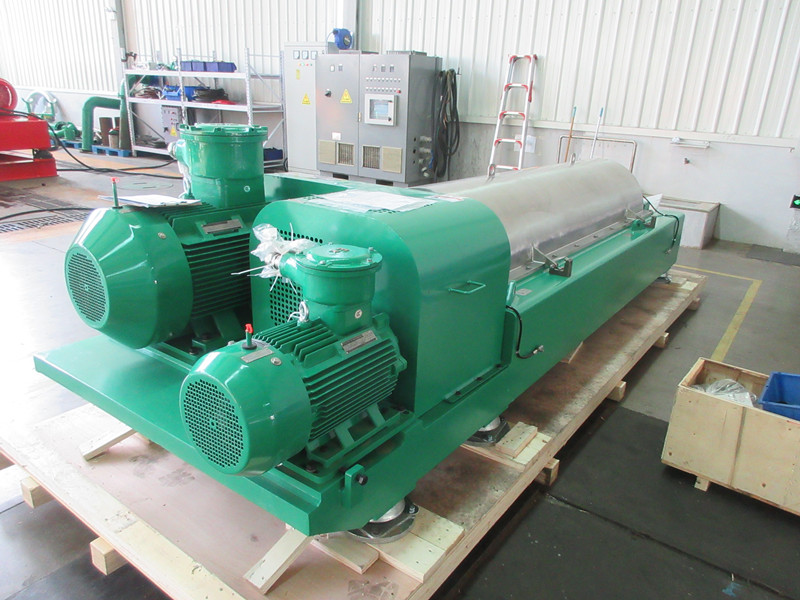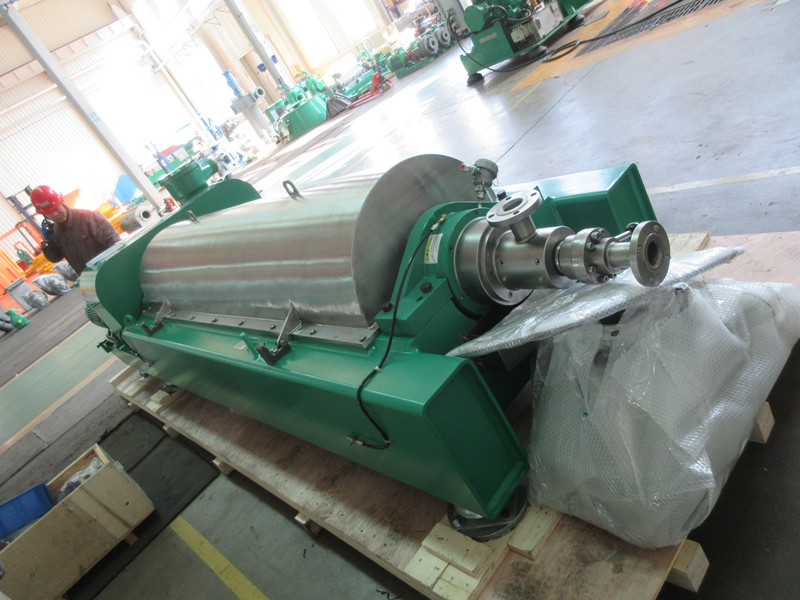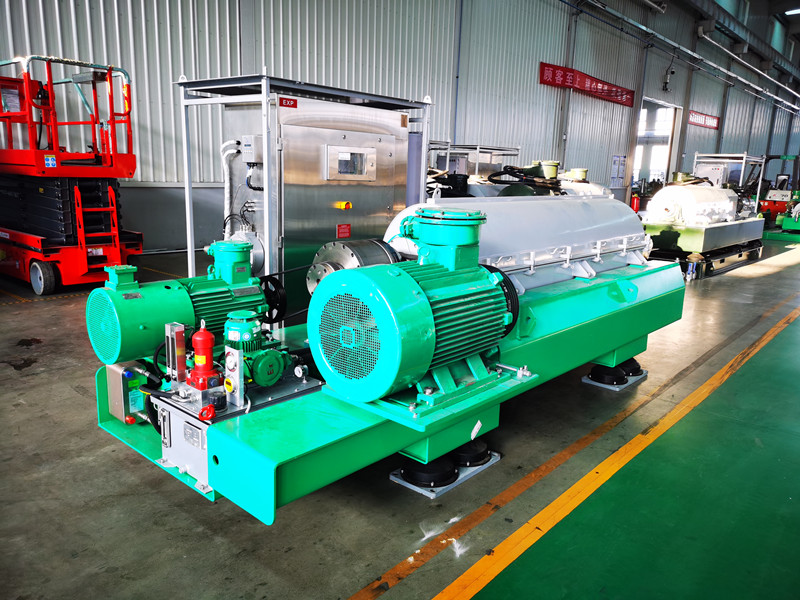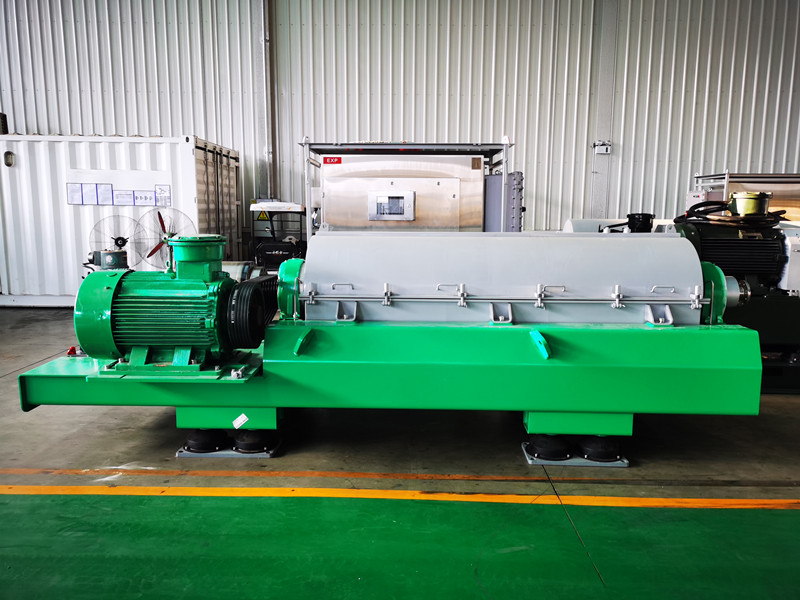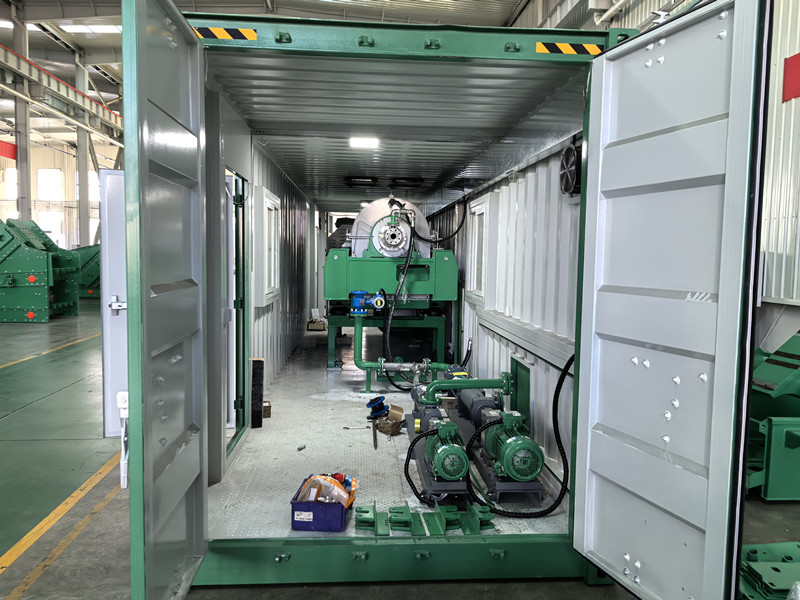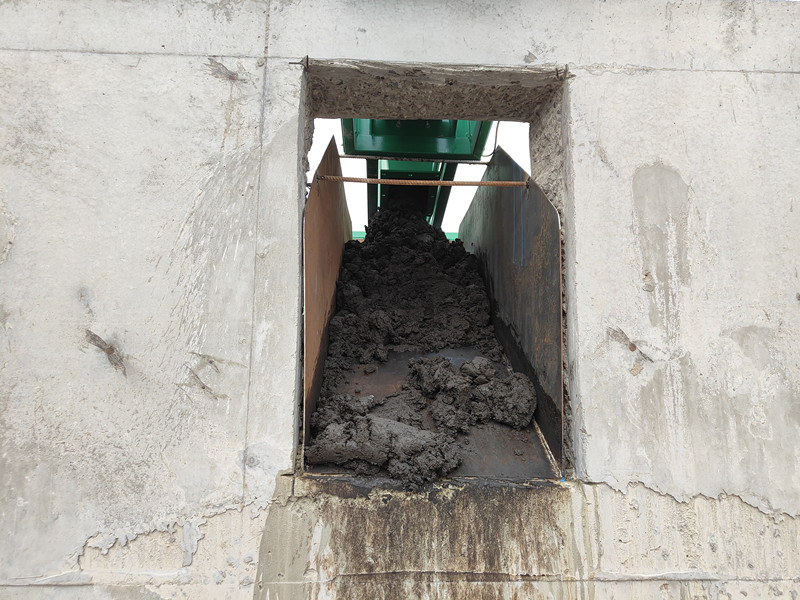This week, GN Separation successfully completed the factory trial installation of 2 complete setss of oil sludge treatment system (OSTS). This milestone marks a significant step toward ensuring the system’s readiness for deployment, as engineers conducted rigorous testing to validate module connectivity, equipment performance, and full system integration prior to final shipment. Continue reading
Decanter Centrifuges and Driling Mud Recycling Unit for overseas client
GN Separation is pleased to announce the recent successful shipment of high-performance solids control equipment to a valued overseas client. This delivery reflects our ongoing commitment to providing advanced, durable, and cost-effective solutions for global drilling operations. Continue reading
GN 3 Phase Decanter Centrifuge for USA Oil Sludge Treatment Project
GN Separation has recently completed the assembly of its GNLWS554 3-phase decanter centrifuge, which is now ready for shipment to the United States. The system will be deployed for the treatment of oily sludge—an industrial byproduct that poses significant environmental and operational challenges.
The Role of Three-Phase Decanter Centrifuges in oil sludge treatment
Oily sludge, generated during oil extraction, refining, and storage, contains a complex mixture of oil, water, and solids. Traditional treatment methods often fall short in achieving effective separation, resulting in high disposal costs and environmental compliance risks.
GN’s 3-phase decanter centrifuge provides a reliable, one-step solution to efficiently separate oil, water, and solids. Utilizing high-speed centrifugal force, the GNLWS554 accelerates the gravitational separation process, enabling oil recovery and significant reduction in waste volume.
Designed to perform in harsh industrial conditions, the GNLWS554 offers enhanced separation efficiency and robust operational reliability, making it an ideal alternative to conventional treatment systems.
Key Features of the GNLWS554 3-phase decanter centrifuge
- Dual-Motor Drive with VFD Precision Control
The GNLWS554 features a dual-motor design with independent VFD control for both bowl and scroll. This allows operators to precisely adjust the differential speed for optimal separation across varying feed conditions. - Tungsten Carbide Wear Protection
To withstand the abrasive characteristics of oily sludge, all critical components—such as scroll flights and discharge ports—are protected with tungsten carbide tiles and sleeves. This significantly extends service life and reduces maintenance costs. - Adjustable Centripetal Pump System
The built-in centripetal pump allows for on-the-fly adjustment of the liquid phase interface. Operators can easily control the separation boundary between the oil and water phases, providing flexibility for different feed compositions and compliance standards.
Wide-Ranging Applications Across Industries
In addition to oily sludge treatment, GN’s three-phase decanter centrifuges are widely used in various sectors:
Food & Beverage: Fat and solid separation in dairy, edible oil, and starch processing
Chemical & Pharmaceutical: Recovery of catalysts, purification of emulsions, and byproduct separation
Municipal Wastewater: Grease and sludge separation in sewage treatment plants
Mining & Minerals: Dewatering tailings and recovering minerals from slurry
The GNLWS554’s performance-proven design—featuring a dual-motor drive, wear-resistant materials, and real-time interface control—ensures stable, high-efficiency operation in all these demanding environments.
As industries face growing regulatory pressures and rising treatment costs, GN Separation’s three-phase decanter centrifuge provides a sustainable, cost-effective solution for sludge and waste management.
For more information, visit GN Separation’s website or contact our team directly.
5 Units GNLW364-FHD Decanter Centrifuge for Overseas Starch Processing Plant
GN Separation has recently completed the delivery of a Hydraulic Drive Decanter Centrifuge (Model: GNLW364-FHD) to an overseas starch processing facility. Powered by Viscotherm’s advanced hydraulic technology, this system delivers efficient, high-performance solid-liquid separation, particularly for high-viscosity applications. Continue reading
GNLW364 Sludge Dewatering Centrifuge for Overseas Environmental Company
Recently, GN Separation successfully completed the production of two GNLW364 sewage sludge dewatering decanter centrifuges for an overseas environmental protection company. Continue reading
The Development Prospect of Decanter Centrifuge Manufacturers
The decanter centrifuge, a type of mechanical separation equipment, has a long history of application dating back to the early 18th century. Initially used in chemical production, it has since found wide adoption across various sectors including pharmaceuticals, metallurgy, dyes, food processing, brewing, ceramics, and environmental protection. Today, despite its long-standing use, much of the industry still relies on intermittent operation modes. However, as industrial equipment technology continues to evolve, end-users are placing increasingly high demands on equipment performance, automation, and sustainability — and the decanter centrifuge industry is no exception. Continue reading
GN Dewatering Centrifuge for Contaminated Soil Washing Slurry Commisioned Successfully in Middle East
GN Separation has recently completed the fabrication and delivery of three GNLW764 decanter centrifuges to a sugar processing facility in Europe. These high-capacity machines are specifically engineered for dewatering applications and will play a vital role in treating wastewater generated during sugar beet washing operations. Continue reading
Will There Be Confusion When Purchasing and Using a Decanter Centrifuge?
The decanter centrifuge is not only a specific type of centrifuge but also a key product offered by GN Separation a manufacturer specializing in Decanter centrifuge technology. To help users better understand both the equipment and the manufacturer, the following addresses common concerns and practical questions related to purchasing and operating a decanter centrifuge.
- How Can You Measure the Moisture Content of Sludge Before, During, and After Decanter Centrifuge Treatment?
When using a decanter centrifuge for sludge treatment, determining the moisture content at various stages is essential for evaluating performance. This can be done using a sludge moisture content rapid tester, which provides accurate and fast readings of both moisture and solid content in the sludge. These devices are simple to operate and allow users to monitor and adjust process parameters effectively.
- Will a Product Manual Be Provided When Purchasing a Decanter Centrifuge?
Yes, manufacturers typically provide a comprehensive product manual with every decanter centrifuge. This includes detailed instructions for installation, operation, maintenance, and troubleshooting. In addition to the manual:
Operational guidelines and safety precautions for trial runs are shared.
Many manufacturers, including GN Separation, offer on-site technical support, including professional engineers to guide users through commissioning and routine operation to ensure proper usage and maximize efficiency.
- What Causes High Idle Current or Abnormal Noise During Operation?
Several issues may arise during operation, but they are generally easy to diagnose:
High Idle Current:
If the centrifuge draws excessive current during idle (no-load) operation, it is often due to residual material buildup or incomplete cleaning inside the drum or conveyor. This adds resistance and increases the load on the motor.
Abnormal Noise:
Strange or unexpected sounds during operation usually point to mechanical issues, such as:
Faulty differential
Improper installation of internal components
In such cases, a thorough inspection should be carried out to identify the source of the problem. Once located, corrective measures such as realignment, part replacement, or differential servicing should be implemented.
While decanter centrifuges are technically advanced machines, confusion during purchase or operation can be avoided by:
Consulting with the manufacturer for pre-sale guidance
Relying on the provided manuals and training
Performing regular maintenance and monitoring operational indicators
For best results, engage directly with experienced technicians to ensure proper model selection, installation, and use of your equipment.
GN Dewatering Centrifuge for Contaminated Soil Washing Slurry Commisioned Successfully in Middle East
GN Separation recently completed the successful commissioning of a containerized sludge dewatering system at a client site in the Middle East. The project has received high praise from the client, highlighting both the outstanding performance of the GNLW654-VFD decanter centrifuge and the technical expertise of GN’s after-sales service engineers.
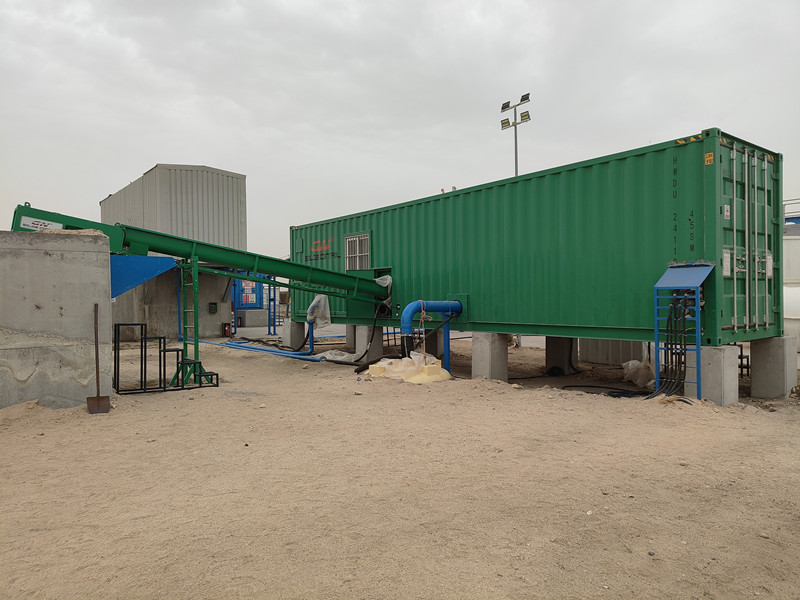 At the heart of the system is the GNLW654-VFD sludge dewatering decanter centrifuge, a high-capacity unit specifically engineered for challenging solid-liquid separation tasks. In this case, the centrifuge was deployed to treat effluent water generated during the washing of oil-contaminated soil—a critical process in the region’s unique environmental context.
At the heart of the system is the GNLW654-VFD sludge dewatering decanter centrifuge, a high-capacity unit specifically engineered for challenging solid-liquid separation tasks. In this case, the centrifuge was deployed to treat effluent water generated during the washing of oil-contaminated soil—a critical process in the region’s unique environmental context.
The Middle East, known for its vast oil reserves, faces ongoing environmental challenges, particularly due to oil spills during extraction and transportation. In the region’s arid desert landscape, soil is a limited and valuable resource. Reclaiming contaminated soil through effective washing and treatment is not only essential for environmental protection but also for sustainable land management.
At the client’s site, the remediation process begins with intensive washing of oil-contaminated soil using water combined with specialized chemical agents. This liberates oil and fine particles from the soil. The resulting slurry is then routed to a flotation tank, where air bubbles aid in the separation of oil and suspended solids. While the surface scum of oil and particles is removed, the remaining sludge—comprising water, residual oil, and fine solids—presents a significant treatment challenge.
This is where GN Separation’s advanced centrifuge technology proves invaluable. The GNLW654-VFD decanter centrifuge utilizes high-speed centrifugal force to efficiently separate solids from liquids, producing clarified water and a drier, more manageable sludge cake. This not only ensures compliance with environmental regulations but also reduces waste volume and disposal costs.
During commissioning, GN’s after-sales engineer meticulously adjusted key operating parameters—including bowl speed and differential speed—to optimize separation performance. The goal was to meet strict clarity requirements for the liquid discharge and achieve the desired dryness in the solid output for easier handling.
The client expressed strong satisfaction with both the equipment’s performance and the engineer’s technical capabilities. The successful deployment of the sludge dewatering system has helped the client enhance environmental compliance, reduce operational costs, and streamline their overall waste treatment process.
This project exemplifies GN Separation’s commitment to delivering customized solutions tailored to the needs of clients across industries and regions. By combining state-of-the-art equipment with expert technical support, GN continues to position itself not just as a supplier, but as a trusted partner in achieving efficient, sustainable operations.
For further inquiries or project consultation, please don’t hesitate to contact GN Separation.
GN will Attend IFAT Eurasia 2025 in Turkey
Next week, GN Separation will participate in the highly anticipated IFAT Eurasia 2025, the region’s premier international trade fair for environmental technologies. Taking place from May 15–17 at the Istanbul Expo Center, this event has firmly positioned itself as the leading business platform for environmental innovations across the Eurasian market. Continue reading
